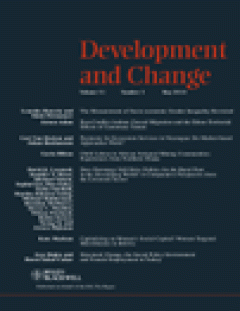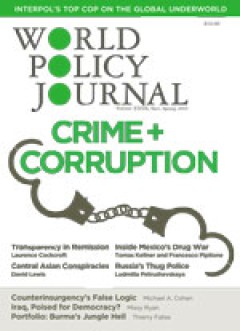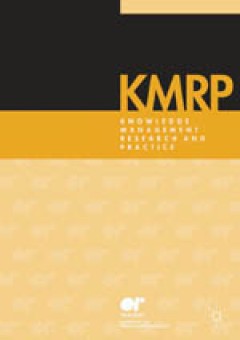Filter by

An Historical Perspective on the Interplay of Christian Thought and Business …
To provide effective guidance for business decisions, a set of ethical principles must be stable over time, rather than responding to changes in the business environment for expediency sake. This article examines the ability of religious principles to maintain such stability by reviewing the historical relationship between commerce and Christianity, beginning with early Christianity and conclud…
- Edition
- Vol. 49 no. 4. December 2010.pp. 652-676
- ISBN/ISSN
- 00076503
- Collation
- -
- Series Title
- Business & Society
- Call Number
- -

Corporate Social Performance Disoriented: Saving the Lost Paradigm?
Corporate social performance (CSP) has been a prominent concept in the management literature dealing with the social role and impacts of the corporation; it has been promulgated as a unifying paradigm for the field. However, the concept of CSP is still lacking strong theoretical foundations and empirical validity, suggesting that the paradigmatic status of CSP might be lost. In this paper, the …
- Edition
- Vol. 49 no. 4, December 2010.pp. 677-703
- ISBN/ISSN
- 00076503
- Collation
- -
- Series Title
- Business & Society
- Call Number
- -

Exploring the Resilience of Bt Cotton's ‘Pro-Poor Success Story’
Expectations play a powerful role in driving technological change. Expectations are often encapsulated in narratives of technological promise that emphasize potential benefits and downplay potential negative impacts. Genetically modified (GM, transgenic) crops have been framed by expectations that they would be an intrinsically �pro-poor� innovation that would contribute powerfully to internati…
- Edition
- Volume 41, Issue 6, November 2010, pages 955–981
- ISBN/ISSN
- 0012155x
- Collation
- -
- Series Title
- Development and Change
- Call Number
- -

Ethnicity, Development and Gender: Tsáchila Indigenous Women in Ecuador
In recent decades, indigenous populations have become the subjects and agents of development in national and international multicultural policy that acknowledges poverty among indigenous peoples and their historic marginalization from power over development. Although the impact of these legal and programmatic efforts is growing, one persistent axis of disadvantage, male�female difference,1 is r…
- Edition
- Volume 41, Issue 6, November 2010. pages 983–1016
- ISBN/ISSN
- 0012155x
- Collation
- -
- Series Title
- Development and Change
- Call Number
- -

Constructing Indigenous Subjectivities: Economic Collectivism and Identity in…
This article uses a governmentality analytic to understand the efforts of indigenous leaders from the Ecuadorian Amazon to shape their organizations� members over the past four decades, particularly efforts to promote collective engagement in market-oriented activities. A close examination of one organization's history reveals that leaders� subjectivity-shaping efforts have been strongly influe…
- Edition
- Volume 41, Issue 6, November 2010, pages 1017–1039
- ISBN/ISSN
- 0012155x
- Collation
- -
- Series Title
- Development and Change
- Call Number
- -

The ‘Politics of the Queue’: The Politicization of People Living with HIV…
Starting from a body of literature on movements around �biological citizenship�, this article analyses the political significance of HIV-positive people's collective action in Tanzania. We explore reasons for the limited impact of Tanzanian AIDS activism on the wider political scene, concluding that the formation of a �movement� is still in its infancy and faces many constraints, though some br…
- Edition
- Volume 41, Issue 6, November 2010, pages 1041–1064
- ISBN/ISSN
- 0012155x
- Collation
- -
- Series Title
- Development and Change
- Call Number
- -

Mungiki, Vernacular Organization and Political Society in Kenya
This article uses the concept of �political society� as unfolded by the �subaltern studies� in India to shed new light on present-day political actors and democratic transitions in Africa. It discusses the political practices and discursive terrains of organizations within �really existing� civil society that are based on identities and regarded as outside legitimate civil society. It looks at …
- Edition
- Volume 41, Issue 6, November 2010, pages 1065–1089
- ISBN/ISSN
- 0012155x
- Collation
- -
- Series Title
- Development and Change
- Call Number
- -

The Impact of Privatization on Land Inheritance among Samburu Pastoralists in…
Privatization of communal land among a community of pastoralists in northern Kenya creates a gap in social institutions relating to land inheritance. This analysis shows that the emergence of a new rule for inheritance is a complex social process and that new rules do not arise automatically. Using theories of institutions and collective action, this study examines the process through which rul…
- Edition
- Volume 41, Issue 6, November 2010, pages 1091–1116
- ISBN/ISSN
- 0012155x
- Collation
- -
- Series Title
- Development and Change
- Call Number
- -

Humanitarian Space as Arena: A Perspective on the Everyday Politics of Aid
�Humanitarian space� denotes the physical or symbolic space which humanitarian agents need to deliver their services according to the principles they uphold. This concept, which separates humanitarian action from its politicized environment, is widely used in policy documents and academic texts, even though empirical evidence abounds that this space is in fact highly politicized. To some extent…
- Edition
- Volume 41, Issue 6, November 2010, pages 1117–1139
- ISBN/ISSN
- 0012155x
- Collation
- -
- Series Title
- Development and Change
- Call Number
- -

The Big Question: How Can Nations Break the Cycle of Crime and Corruption?
If not quite as apocalyptic as pope would have us believe, corruption and crime all to often drag nations into a cycle of deprivation and wanton greed-companies bribing bureaucrats in exchange for lucrative contracts, petty graft greasing the palms of low-level civil servants, and powerful politicians enriching themselves at the expense of their people and the advancement of society. How do nat…
- Edition
- Vol. XXVII, No. 1, Spring 2010.pp. 3-16
- ISBN/ISSN
- 07402775
- Collation
- -
- Series Title
- World Policy Journal
- Call Number
- -

Social semantic cloud of tags: semantic model for folksonomies
A growing number of tagging applications have begun to provide users the ability to socialise their own keywords. Tagging, which assigns a set of keywords to resources, has become a powerful way for organising, browsing, and publicly sharing personal collections of resources on the Web. It is called folksonomies. These systems on current social websites, however, have deficiencies in defining t…
- Edition
- Vol. 8, No. 3, September 2010.pp. 193–202
- ISBN/ISSN
- 14778238
- Collation
- -
- Series Title
- Knowledge Management Research & Practice
- Call Number
- -

Integrating educational institutions to produce intellectual capital for sust…
This research is part of a broader investigation to analyse the processes followed by the Caguas Municipality at the Commonwealth of Puerto Rico in an effort to develop the characteristics of a �Smart City� as an example of sustainable development. We describe the integration of the educational institutions� initiatives and the municipal government strategic plan to contribute to the knowledge …
- Edition
- Vol. 8, No. 3, September 2010.pp. 203–215
- ISBN/ISSN
- 14778238
- Collation
- -
- Series Title
- Knowledge Management Research & Practice
- Call Number
- -

A hybrid fuzzy real option analysis and group ordinal approach for knowledge …
The intensity of global competition and ever-increasing economic uncertainties has led organizations to search for more efficient and effective ways to improve organizational productivity by investing in knowledge management (KM) initiatives. In this research, we propose a framework to assess KM investment opportunities. Precise and crisp information is fundamentally indispensable in strategic …
- Edition
- Vol. 8, No. 3, September 2010. pp. 216–228
- ISBN/ISSN
- 14778238
- Collation
- -
- Series Title
- Knowledge Management Research & Practice
- Call Number
- -

Knowledge governance within clusters: the case of small firms
Despite the vast literature on knowledge management, little research has addressed the specificities of knowledge integration at the cluster level. Moreover, the literature on clusters has not focused on the role that governance may play in knowledge management. Anchored in a knowledge-based perspective, this paper aims at bridging the two fields, filling the gap by analysing the role of cluste…
- Edition
- Vol. 8, No. 3, September 2010. pp. 229–239
- ISBN/ISSN
- 14778238
- Collation
- -
- Series Title
- Knowledge Management Research & Practice
- Call Number
- -

Building script-based tacit knowledge in call centre trainees
An exploratory case study on a technical support call centre in China is presented, which investigates a new paradigm that script-based tacit knowledge for action is built in the brains of learners, rather than transferred. Twelve techniques used by the case study organization to build tacit knowledge scripts in the minds of the trainees are discussed. It was found that one type of script-based…
- Edition
- Vol. 8, No. 3, September 2010. pp. 240–255
- ISBN/ISSN
- 14778238
- Collation
- -
- Series Title
- Knowledge Management Research & Practice
- Call Number
- -

A conceptual model for managing incompatible impacts of organisational struct…
Awareness levels of individuals about various aspects of the collaborative processes can be achieved by effective promotive interactions among them. Cultural structures are regarded as one of the major determinants of knowledge sharing patterns and awareness levels of individuals in collaborative contexts. Through an exploratory review of the literature, the present study points to the two riva…
- Edition
- Vol. 8, No. 3, September 2010. pp. 256–264
- ISBN/ISSN
- 14778238
- Collation
- -
- Series Title
- Knowledge Management Research & Practice
- Call Number
- -

Towards a typology of knowledge-intensive organizations: determinant factors
Phrases such as �knowledge-intensive organizations� (KIOs) and �knowledge-intensive firms� (KIFs), have recently found common usage, describing the distinct activities and attributes of some organizations. But a review of the literature reveals a lack of consensus among scholars and practitioners on the definition of KIOs. What is also absent from the discussion is an agreement on the factors t…
- Edition
- Vol. 8, No. 3, September 2010. pp. 265–277
- ISBN/ISSN
- 14778238
- Collation
- -
- Series Title
- Knowledge Management Research & Practice
- Call Number
- -

The moderating effect of knowledge sharing on the relationship between manufa…
This paper investigates the critical role of knowledge sharing (KS) in leveraging manufacturing activities, namely integrated supplier management (ISM) and new product development (NPD) to improve business performance (BP) within the context of Taiwanese electronic manufacturing companies. The research adopted a sequential mixed method research design, which provided both quantitative empirical…
- Edition
- Vol. 8, No. 4, December 2010. pp. 285–306
- ISBN/ISSN
- 14778238
- Collation
- -
- Series Title
- Knowledge Management Research & Practice
- Call Number
- -

Knowledge transfer in post-merger integration management: case study of a mul…
Faced with demanding time constraints and the need to compete and communicate across a global market, firms have engaged in mergers and acquisitions (M&As) to accomplish various objectives, including, but not limited to, increasing growth potential and expanding product lines. Given the vital role of knowledge in the M&A context, the aim of this case study is to explore the literature in the ar…
- Edition
- Vol. 8, No. 4, December 2010. pp. 307–321
- ISBN/ISSN
- 14778238
- Collation
- -
- Series Title
- Knowledge Management Research & Practice
- Call Number
- -

Knowledge markets in firms: knowledge sharing with trust and signalling
Knowledge sharing and learning are critically important to the success of knowledge management. In this research, we study the design of incentive rewards to facilitate knowledge transfer utilizing an internal knowledge market within organizations. The internal knowledge market is modelled as a marketplace where knowledge providers can send signals about their knowledge and learners may volunta…
- Edition
- Vol. 8 No. 4, December 2010. pp. 8, 322–339
- ISBN/ISSN
- 14778238
- Collation
- -
- Series Title
- Knowledge Management Research & Practice
- Call Number
- -
 Computer Science, Information & General Works
Computer Science, Information & General Works  Philosophy & Psychology
Philosophy & Psychology  Religion
Religion  Social Sciences
Social Sciences  Language
Language  Pure Science
Pure Science  Applied Sciences
Applied Sciences  Art & Recreation
Art & Recreation  Literature
Literature  History & Geography
History & Geography